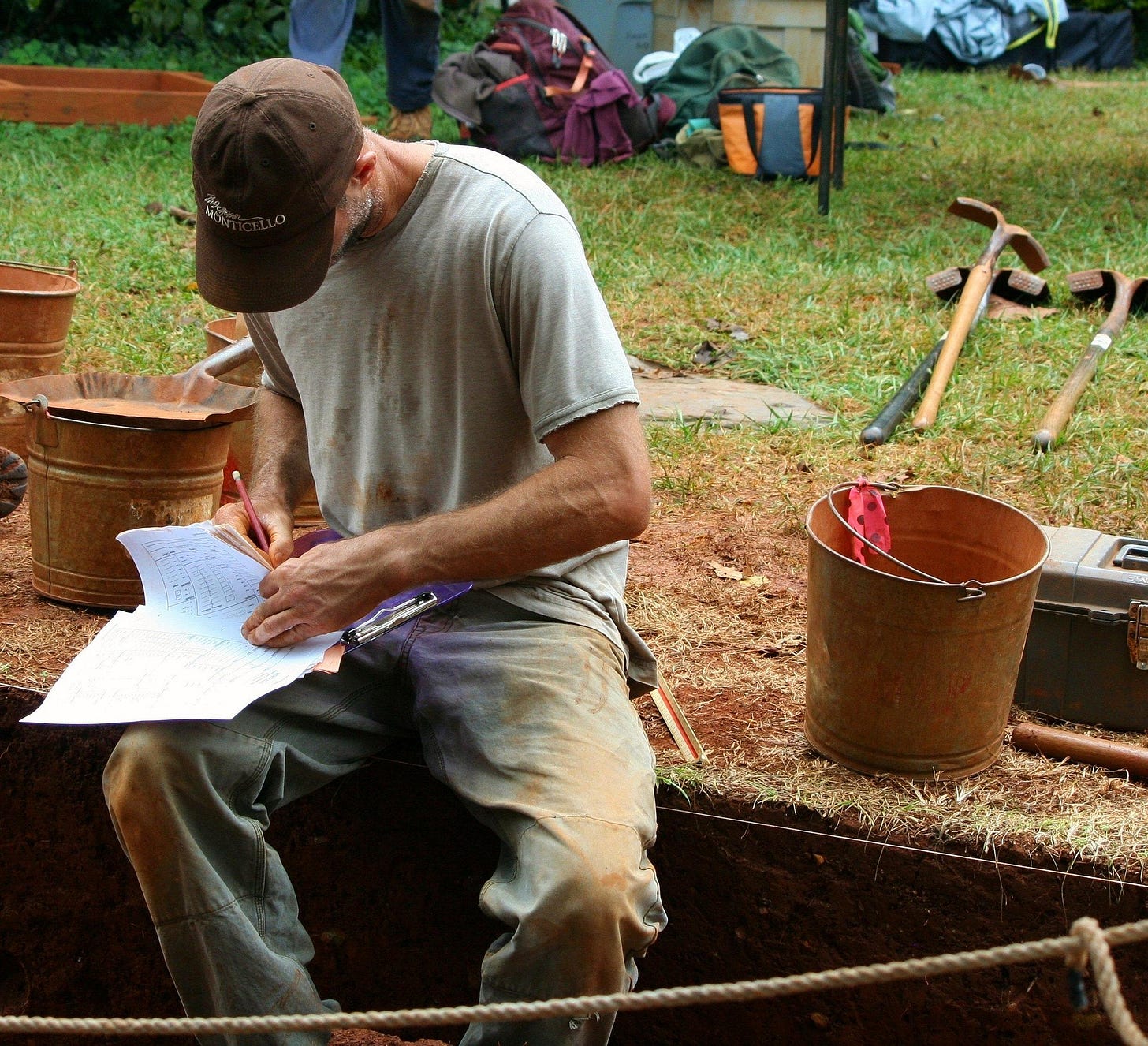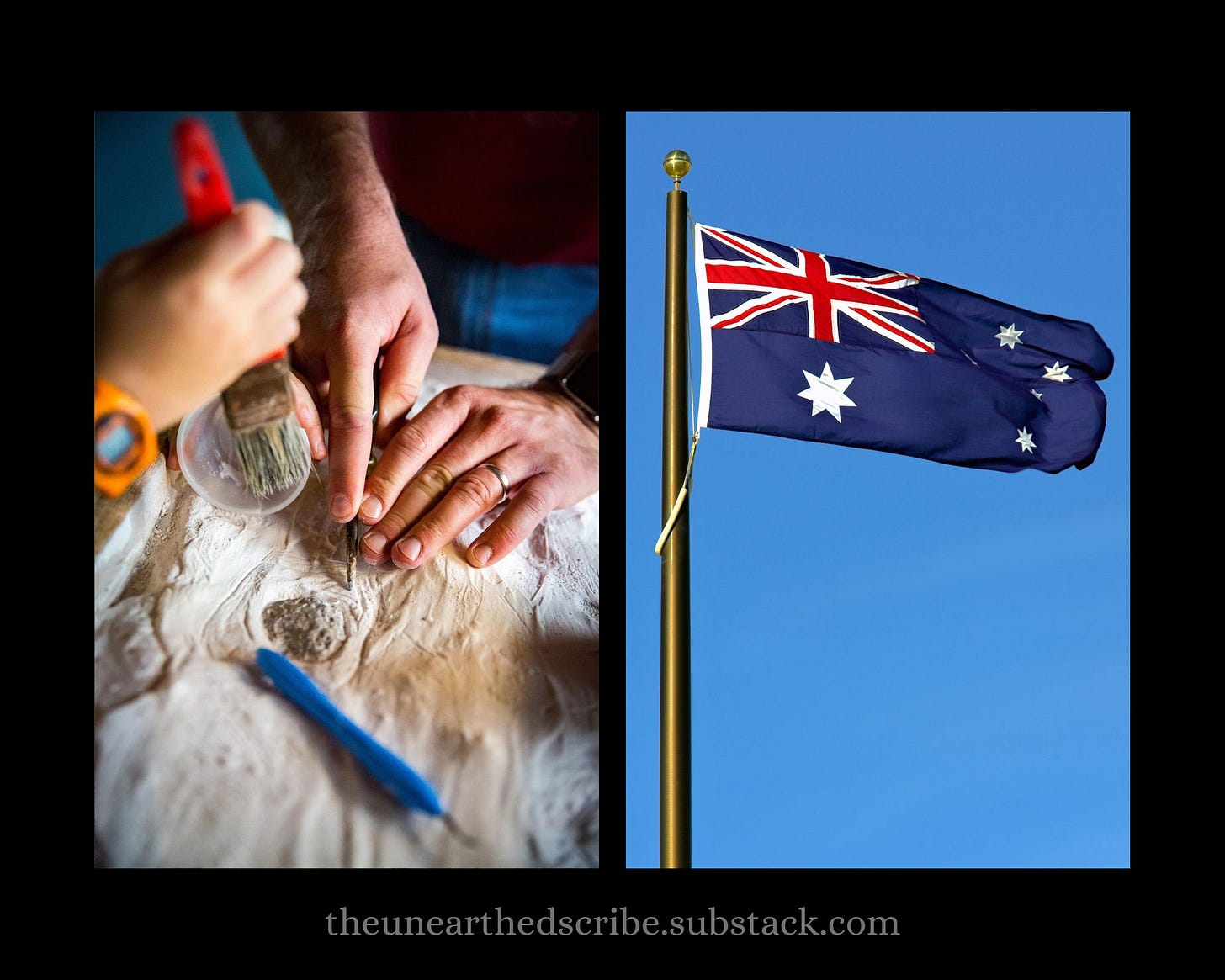The morning on a dig begins with quiet music—trowels skimming soil, brushes breathing dust from the day’s small miracles. Every movement is deliberate. Because one careless move and the trench wall slumps; the layers collapse; the story is lost—not just for you, for everyone who will come after.
Lately in my country, within our own ranks, I’ve watched something similar happen: the impulsive move, the slump, the loss of story. We want a better Australia. Yet we spend so much time pushing each other that our shared ground keeps sliding away. Labels replace listening. Purity tests replace proof. Dialogue—our best tool—is left lying in the dirt.
When I feel despair, I return to what the earth has taught me. Archaeology is an argument with time: patient, humble, evidence-first. It has rules that protect fragile truths. We can borrow those rules for our civic life.
1) Keep the stratigraphy
On site, context is everything. A coin without its layer is just metal. A quote without context is just noise. Before we judge a person or a position, we must keep the layer intact. Who said it? When? What problem were they answering? What evidence did they have? If we collapse context to win a point today, we lose the ability to know anything tomorrow.
2) Write the field notes
Archaeologists write down what they think they see—and what they might be wrong about. Sources, measurements, doubts. In public life, this looks like: “Here’s my claim, here’s my source, here’s my uncertainty.” It’s slower than a catchy slogan, but it gives the next person something solid to build on.
3) Use reversible methods
Conservators choose adhesives that can be undone. If new evidence appears, we can change course without breaking the artefact. Our rhetoric should be the same: critique behaviours, not identities; leave people a way back. Shame is acid—fast, effective, and ruinous. Respect is a reversible solvent.
4) Share the trench
No one owns the site. The cause isn’t a private collection; it’s a common inheritance. If we gate-keep every disagreement, we end up guarding an empty field. A trench works because different hands bring different skills: the surveyor, the photographer, the person with the hawk’s eye for texture. Disagreement is an asset when we treat it like expertise entering the square, not sabotage.
5) Don’t smash the pot to win the sherd
It is tempting to break an opponent’s credibility to secure a single triumphant piece. But a whole vessel teaches more than a trophy sherd. Preserve as much of the other person’s argument as you can, then place your counter-evidence carefully. That’s how truth keeps its shape.
To make this practical, I’ve begun using a simple checklist in my own conversations—online and off.
Consider it a pocket field guide.
The Open Dialogue Protocol
• Define the question (“What are we actually solving?”)
• Agree to the terms (Half our fights are about vocabulary)
• Present evidence (One claim, one source)
• Restate the other view better than they did; ask if you got it right
• State uncertainty (Where could you be wrong?)
• Log agreements (Keep a ‘finds tray’ of common ground)
• Rotate roles (Advocate ↔ sceptic)
• Exit with respect (Leave doors open; the conversation may need to resume)
If that sounds idealistic, it’s also efficient.
Our opponents don’t have to defeat us if we keep defeating ourselves. Unity is not sameness; it is coherence—many pieces in the proper relation. Think mosaic: strong because difference is arranged, not erased.
Myth offers its reminder, too: a chorus can correct a hero before tragedy becomes fate. The chorus isn’t the enemy; it’s the conscience of the stage. And the ship-of-Theseus tells us that an identity can survive repair—if we care about the seams. We can change planks and still keep our name, provided we keep our course.
What are we doing this for? Not for the thrill of being right among friends, but for the chance of being useful among strangers. The future is watching how we argue. Are we the generation that smashed the pot for a sherd—or the one that documented, conserved, and handed over a vessel still strong enough to hold water?
I’m choosing the second option. In my work, I hold fragments and try to keep their stories alive. In my civic life, I want to do the same—keep the context, keep the conversation, keep the cause coherent. We are custodians, not owners. And if we keep the field notes faithfully, perhaps we will deserve the country we say we love.





"And the ship-of-Theseus tells us that an identity can survive repair—if we care about the seams.”
What an apt description of how we preserve our national dignity!
This is a superb analogy for how to view our actions in our civic lives, Irene. Excellent!
Thank you again for your powerful and honest take 🙏